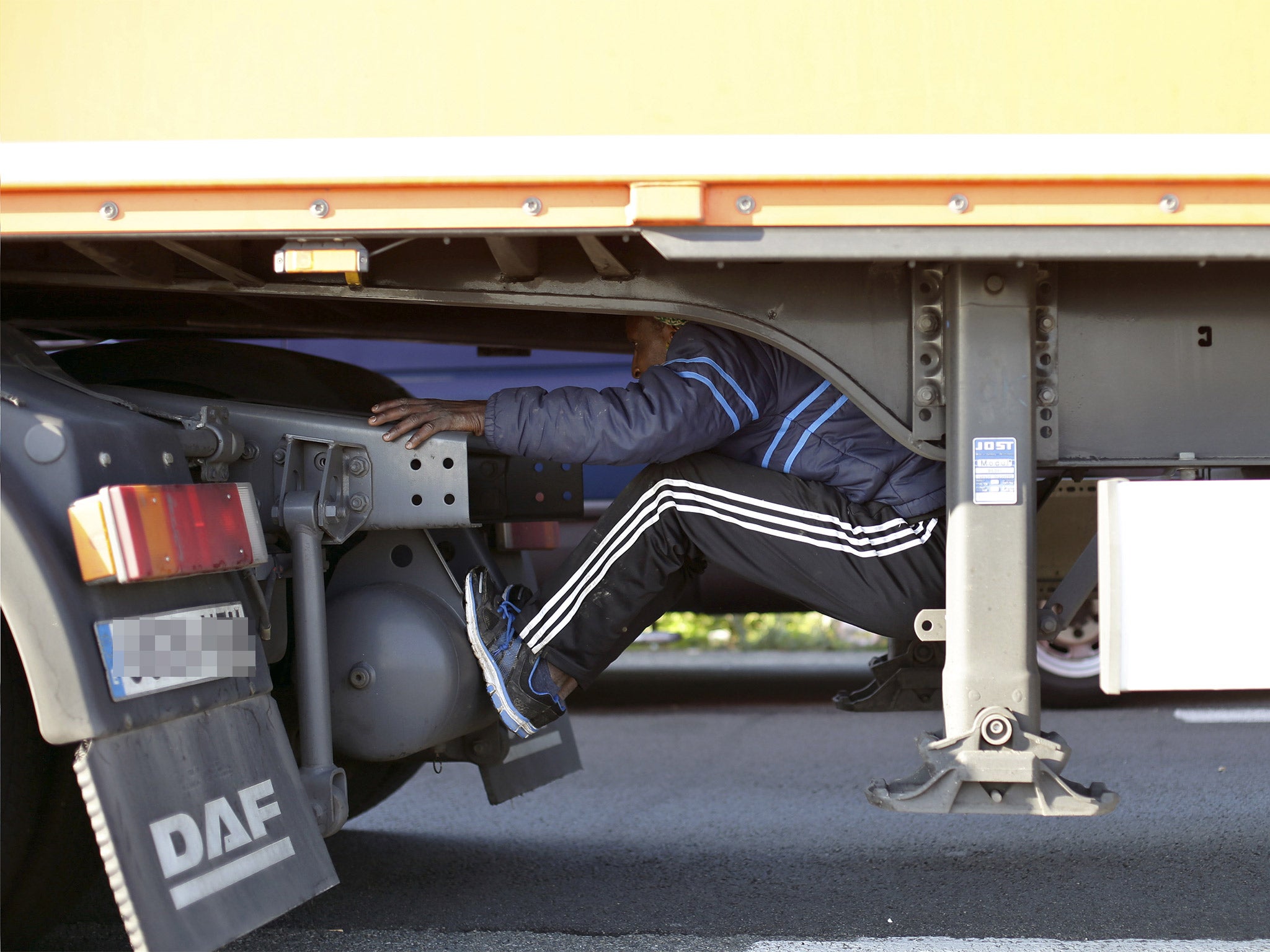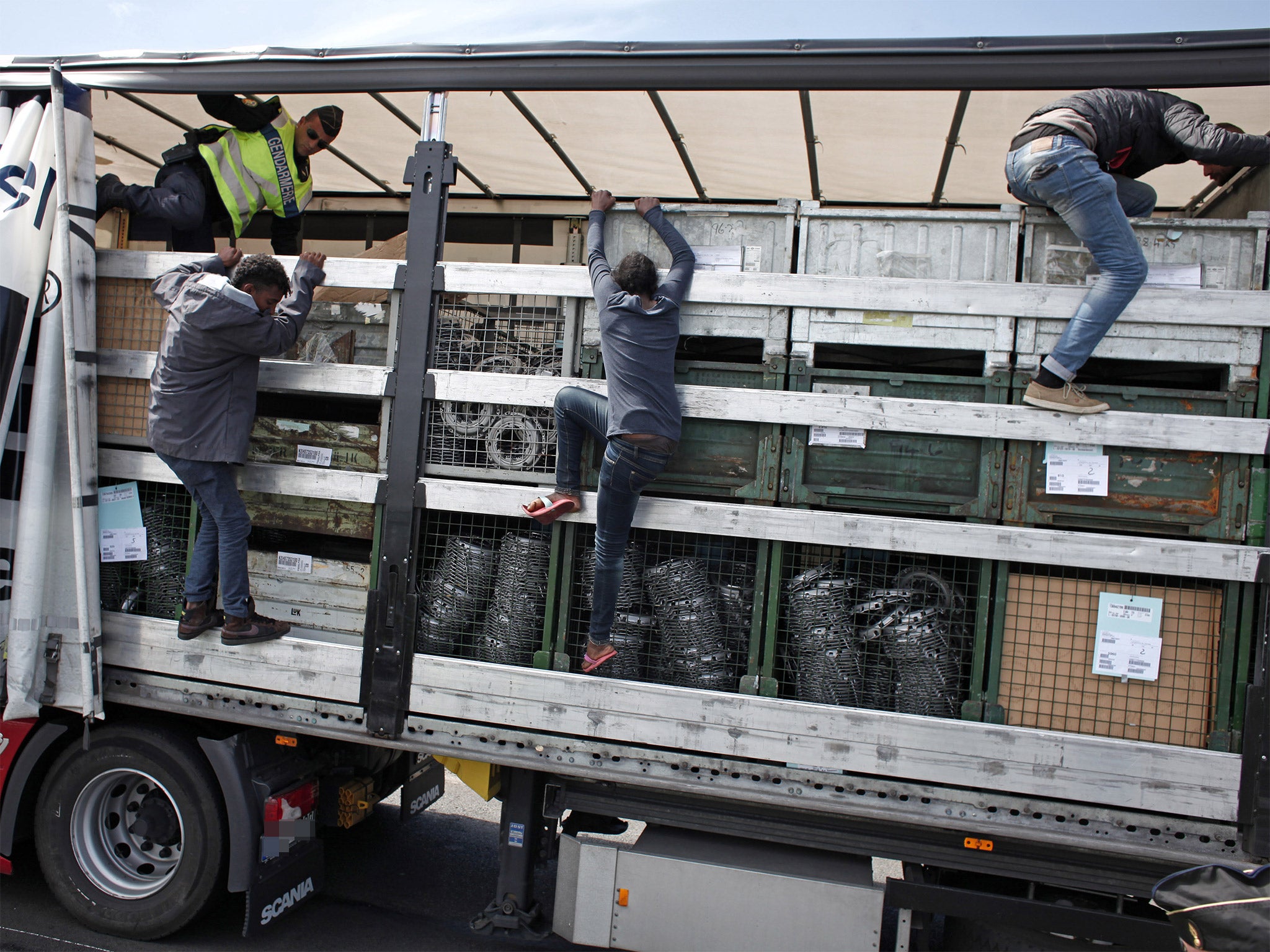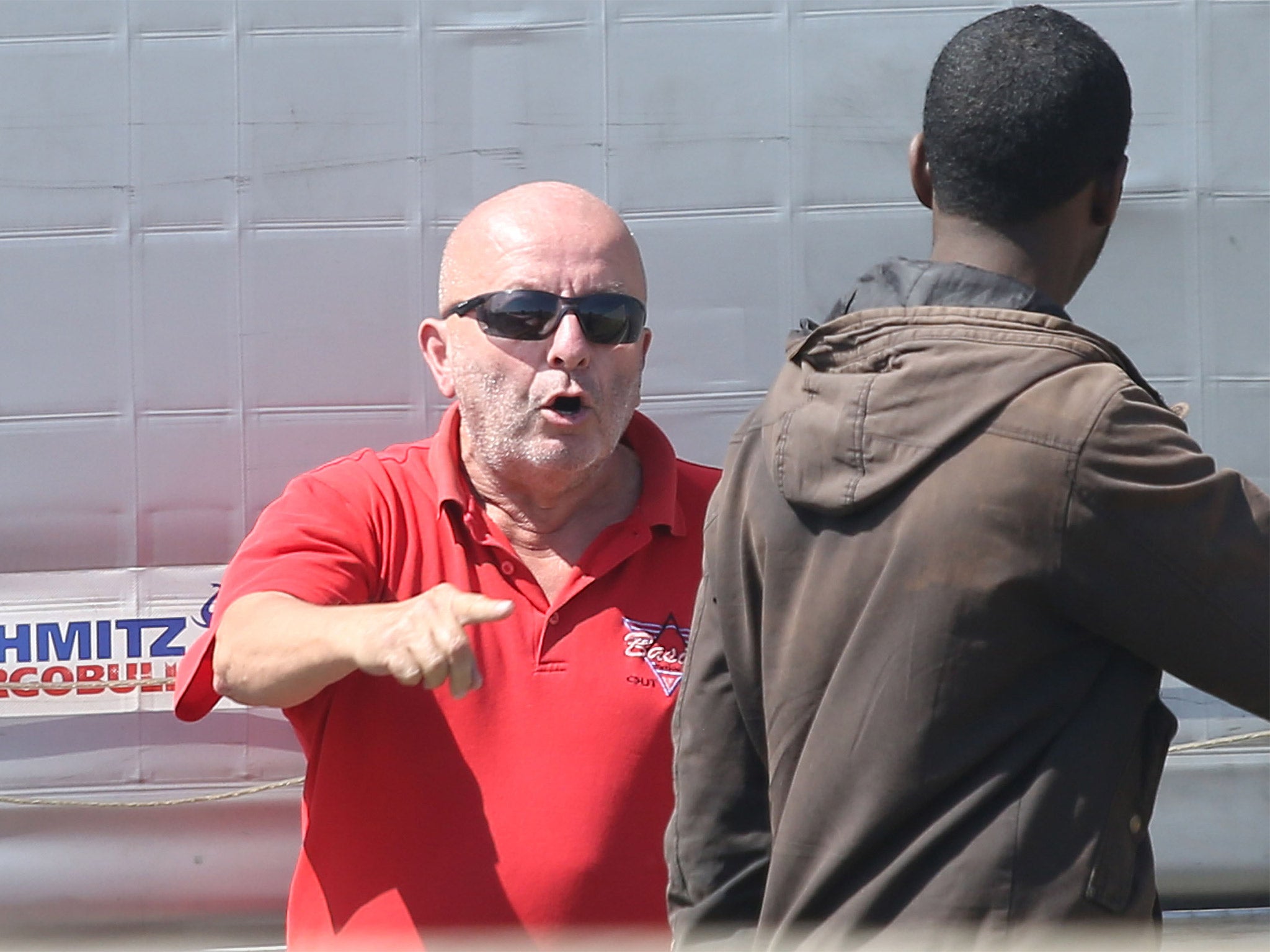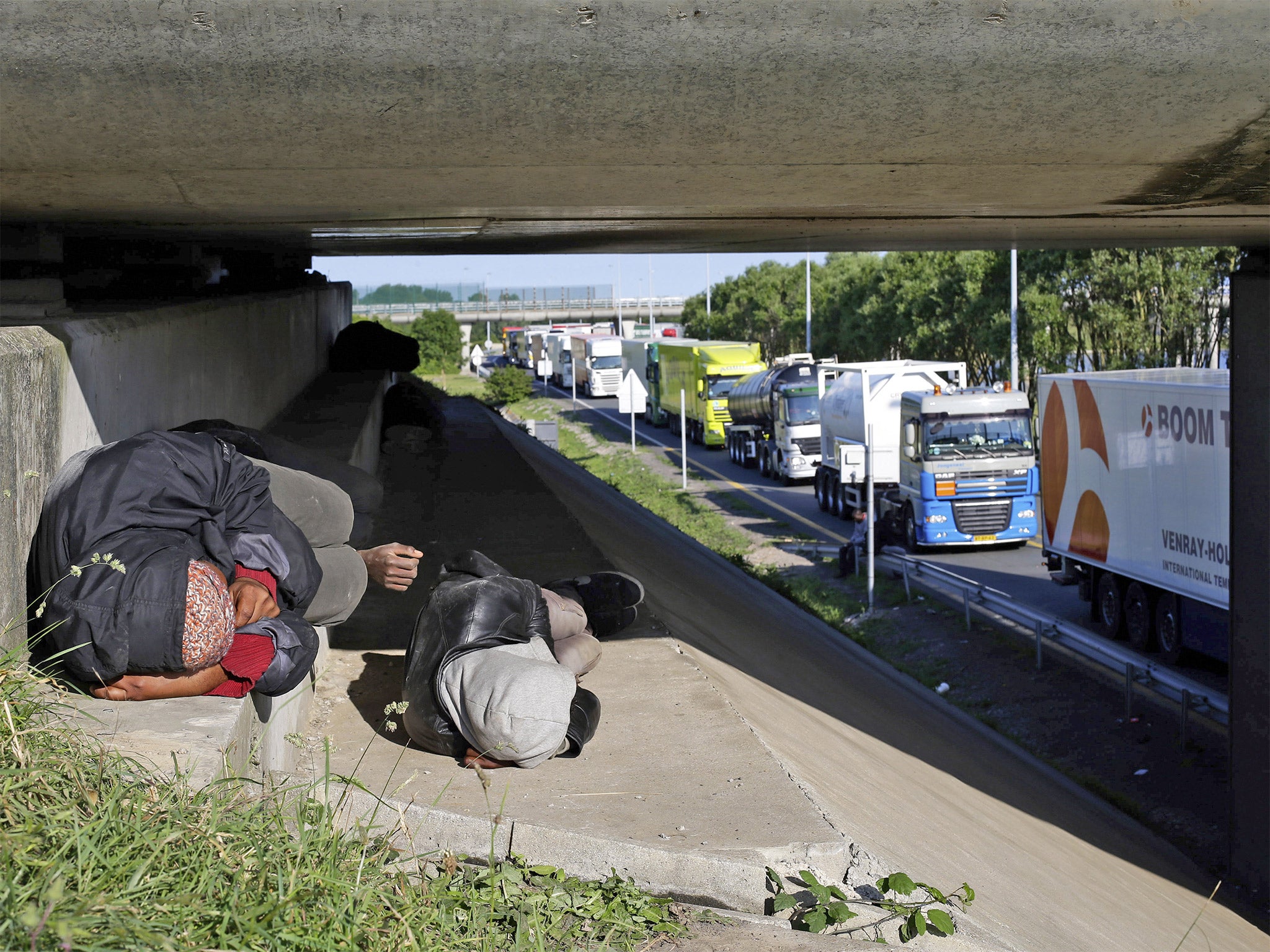Calais crisis: Migrants striving to reach England grateful for 'traffic jam sent from heaven'
A 'dougar' has long been migrants' best chance to cross the Channel

Your support helps us to tell the story
From reproductive rights to climate change to Big Tech, The Independent is on the ground when the story is developing. Whether it's investigating the financials of Elon Musk's pro-Trump PAC or producing our latest documentary, 'The A Word', which shines a light on the American women fighting for reproductive rights, we know how important it is to parse out the facts from the messaging.
At such a critical moment in US history, we need reporters on the ground. Your donation allows us to keep sending journalists to speak to both sides of the story.
The Independent is trusted by Americans across the entire political spectrum. And unlike many other quality news outlets, we choose not to lock Americans out of our reporting and analysis with paywalls. We believe quality journalism should be available to everyone, paid for by those who can afford it.
Your support makes all the difference.Omar and his friends, stood on a motorway verge in Calais, called it "dougar". The word translates as "traffic jam" and it has long been their best chance of crossing the Channel to a new life in Britain. The last 24 hours has, for them at least, been a "dougar sent from heaven".
The aftermath of the ferry workers' strike which brought the French ferry port and the adjoining Channel Tunnel to a grinding, chaotic halt on Tuesday has continued to cause long queues - offering a second day of opportunity for some of the 3,000 migrants caught in Calais's grim limbo to try and board trucks heading for the UK.
Omar, a rangy 22-year-old with a crooked smile from the Sudanese capital of Khartoum, had tried for most of Tuesday night to perform the perilous trick of the "dougar" specialists by attaching himself to the underside of a stationary truck with a belt fashioned from webbing and a steel hook.

He had succeeded twice but each time was spotted by French CRS riot control officers who ushered him back out from under the wheels and sent him once more on his way. Other received less gentle treatment - one British motorist caught in the queues described seeing CRS officers spraying the trucks with pepper spray and watching migrants "drop off like flies".
Undismayed by his failure, Omar told The Independent: "It is the way it works. You try one hundred times, two hundred times, and one day you will get through the checks and the sniffer dogs to England. This dougar is sent from heaven - we can try many more times."
The reason the long lines of stationary HGVs are regarded as a celestial gift is not that this week's industrial dispute has increased the chance of success for Omar and his colleagues - most migrants seemed to be being spotted immediately or later removed during security checks. It is instead that the conveniently slowed traffic offers a decreased chance of death.
At least 15 migrants died last year in and around Calais as they spent months in squalid camps, playing a nightly - and, increasingly, daily - lethal game of cat and mouse to board the trucks. The most recent victim - a 25-year-old Eritrean man - was killed a fortnight ago. He died as he fell from the moving truck to which he had failed to attach himself securely close to the Tunnel entrance at Coquelles.
Omar, who like many others transiting through Calais is only here after surviving the even more treacherous ordeal of crossing the Mediterranean in an overloaded boat from Libya, said: "A stopped lorry is better than a moving one. This strike helps. But it is still tough - who wants to travel or live like this? Inshallah, I will get across soon and do something better in England. A singer maybe - I'm told I sound pretty good."
The uneasy coexistence between migrants - many of them refugees from bestial conflicts and regimes in places such as Syria or Eritrea; others simply seeking a better life - and their often reluctant hosts in Calais has reached a new nadir of mutual frustration in recent weeks.
The numbers estimated to be living rough in the town have increased from 2,000 to around 3,000 in the last year. One aid worker said he expected the total to reach closer to 4,000 before the end of the summer. The Home Office has said the number of interceptions of "clandestine entrants" to the UK has reached 19,000 so far this year - more than double the number during the same period in 2014.

The result is the existence of the "New Jungle" or "Jungle Deux" - a shanty town of tarpaulin-swathed tents and ad hoc huts which has appeared on the edge of Calais since hundreds of migrants were cleared from the city centre earlier in the year and is now home to most of its transitory population.
The French government this week announced plans to spend 500,000 euros (£360,000) to make "official" the New Jungle, which is named after a previous camp in the Calais hinterland which became associated with lawlessness in the face of official indifference. Electricity, running water and buildings will be provided after the United Nations and aid groups described the present situation, under which the camp is also divided into different and often rival nationalities, as an "intolerable humanitarian scandal".
The Calais authorities have sought to lay blame for their status as a bottle neck in the tide of human aspiration and desperation flowing from the Mediterranean squarely at Britain's door. The deputy mayor, Philippe Mignonet this week called for all border controls to moved back to the other side of the Channel, threatening to "block the port" unless action is taken.
It is an atmosphere in which extremists are increasingly seeking to prosper. A far-right group calling itself "Sauvons Calais!" or "Let's Save Calais!" held a demonstration last week, waving a banner proclaiming that the town had been "dirtied" by immigration.

Few will concur publicly but many of in the port proclaimed themselves weary of the constant ebb and flow of migrants and police vans, whose occupants have been the subject of accusations of brutality.
Jean-Claude Wascat, collecting mussels in the harbour next to the ferry terminal with his wife, said: "We wish them well but we would like to have nothing more to do with the migrant problem now. They are not here to contribute to our town and I think people struggle to see why we should help much more."
Such fatigued disdain is far from universal. The migrants are sustained by hand outs from local charities and the skinheads of Sauvons Calais! were outnumbered ten to one by a counter-demonstration calling for tolerance. One placard, carried by an immigrant, read: "We live in the jungle but we are not animals."
In the meantime, even as the traffic eased last night, the deadly serious game of "dougar" shows no signs of abating.
Mahmood Hafeez, a 35-year-old teacher from the Syrian city of Aleppo, who has spent three months trying to make the final leg of his journey to Britain, said: "It's a routine. You spend one day of 'dougar' and then have one day of rest. It's exhausting but the alternative is to pay 1,000 euros to smugglers. I don't have 1,000 euros. I don't have much choice."
Join our commenting forum
Join thought-provoking conversations, follow other Independent readers and see their replies
Comments